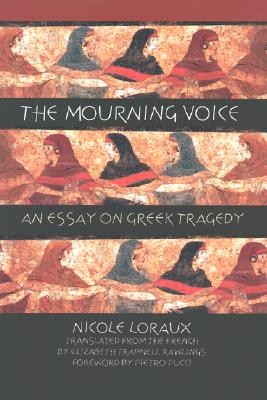
- We will send in 10–14 business days.
- Author: Nicole Loraux
- Publisher: Cornell University Press
- ISBN-10: 0801438306
- ISBN-13: 9780801438301
- Format: 15.5 x 24.1 x 1.5 cm, kieti viršeliai
- Language: English
- SAVE -10% with code: EXTRA
Reviews
Description
In The Mourning Voice, Nicole Loraux presents a radical challenge to what has become the dominant view of tragedy in recent years: that tragedy is primarily a civic phenomenon, infused with Athenian political ideology, which envisions its spectators first and foremost as citizens, members of the political collective. Instead, Loraux maintains, the spectator addressed by tragedy is the individual defined primarily in terms of his or her humanity, rather than in terms of affiliation with a political group. The plays, she says, involve the spectators in the emotional expressiveness of tragic suffering, thereby creating a theatrical identity. Aroused by the experience of suffering, the audience is reminded that it is witnessing a theatrical representation of the instability of the human condition--a state that Loraux asserts tragedy is uniquely suited to convey.
EXTRA 10 % discount with code: EXTRA
The promotion ends in 23d.10:35:59
The discount code is valid when purchasing from 10 €. Discounts do not stack.
- Author: Nicole Loraux
- Publisher: Cornell University Press
- ISBN-10: 0801438306
- ISBN-13: 9780801438301
- Format: 15.5 x 24.1 x 1.5 cm, kieti viršeliai
- Language: English English
In The Mourning Voice, Nicole Loraux presents a radical challenge to what has become the dominant view of tragedy in recent years: that tragedy is primarily a civic phenomenon, infused with Athenian political ideology, which envisions its spectators first and foremost as citizens, members of the political collective. Instead, Loraux maintains, the spectator addressed by tragedy is the individual defined primarily in terms of his or her humanity, rather than in terms of affiliation with a political group. The plays, she says, involve the spectators in the emotional expressiveness of tragic suffering, thereby creating a theatrical identity. Aroused by the experience of suffering, the audience is reminded that it is witnessing a theatrical representation of the instability of the human condition--a state that Loraux asserts tragedy is uniquely suited to convey.


Reviews